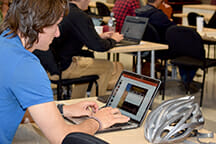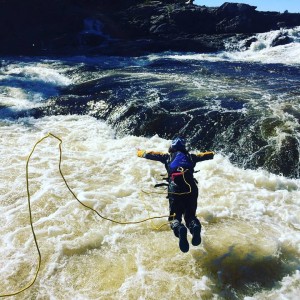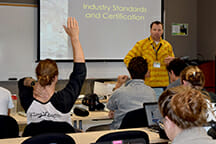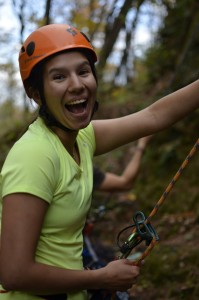Frequently Asked Questions
Learn the answers to the most Frequently Asked Questions for the Outdoor Adventure Program.
What documents do students need to submit to the College?
Prior to starting the program, all ODA students must submit the following items:
- Health Assessment Form – this is a very important form that must be completed before the Program Readiness Camps
- 18 or Older – Sign and submit the Assumption of Risk Form for Non-Minors
- A letter of intent, resume and two references
- Under 18 – Sign and submit an Outdoor Adventure Program Assumption of Risk and Indemnifying Release Form for minors and a Parental Consent for Minors
- Proof of current basic/standard First Aid Certification
For complete details on the application process, review or download our Outdoor Adventure Applicant’s Handbook.
Is there an opportunity to travel during the Outdoor Adventure Program?
Yes. Each semester there is an expedition where students travel to various locations in Eastern Ontario or Quebec. Students can also choose to travel internationally with the opportunity to travel to Costa Rica, Belize or Iceland as elective courses. * Extra fees apply for international travel but scholarships are available.
What if I don’t have the Grade 11 math pre-requisite?
The Outdoor Adventure Program is based on a business curriculum, so math concepts and problem-solving abilities are important. There are many equivalent math credits, including grade 11 university level and several Grade 11 college math courses. Call if you are unsure if your course qualifies.
If you did not take Grade 11 college Math, you can write a pre-admissions Math test. If you score at a grade 11 level then it is considered an equivalent. Details on this testing can be found on our Testing Services site.
If you are applying as a mature student and do not have the appropriate pre-requisites, contact us regarding upgrading and testing for equivalency.
What does a typical week look like in this program?

At least two days of each week students are away, sometimes up to 12 days at a time, training in specific outdoor activities. The other three days of the week are spent on campus, in the classroom with some field trips incorporated into academic learning. Year 1 of this program is introductory, covering the basic skills in many disciplines, from Whitewater Raft Guide training to Snowboard or Ski Instructor status.
What can I expect to experience during my first week of school?
For Level 1 students, the first week of classes takes place off-campus at Wilderness Tours, our training partners, and is known as Fall Camp. It is a credit course that introduces students to their fall field courses and also to their instructors and college professors. We also go over a big ‘gear talk’, and a comprehensive overview of the program, including all of our policies and procedures.
How do students obtain the CPR Certification required for admission into the program?
A current basic/standard First Aid and CPR certification is required prior to the start of classes. If a student needs this, they can contact a St. John Ambulance office in their area to see when they are hosting a First Aid/CPR C course.
What are the certifications a student could earn in the Outdoor Adventure Program?
A sample of certifications that students may earn include:
- Wilderness First Responder
- Snowboard OR Alpine Ski Instructors Level 1
- Lake Canoe Skills Instructor
- Moving Water Canoeing Tandem/Solo
- Canoe Tripping Proficiency levels
- Day Tour Guide, Cycle & Mountain Bike
- Multi-Day Cycle Tour Leader
- Sustainable Trails Workshop
- Leave No Trace Awareness, Trainer and Master Educator
- Whitewater Kayak Instructor/Leader
- Sea Kayak Skills Level 2
- Swiftwater/Floodwater Rescue, Operations, Level 2
- Swiftwater/Floodwater Rescue, Standard, Level 3
- Bicycle Repair and Maintenance
- Safe Food Handler
*Certifications are offered through partnerships with external certification bodies and are not controlled by the Outdoor Adventure Program. Certification fees are included in tuition; annual membership fees with certifying agencies are the responsibility of the student.
Why are some courses 16 hours and some are 96 hours?
A short, introductory-style course is 16hrs (one day is counted as 8hrs), whereas longer courses are typically expeditions or specialty/certification-based courses.
What is the difference between the Outdoor Adventure Program and Algonquin’s Outdoor Adventure Naturalist Program?
The Outdoor Adventure Program (ODA) and Algonquin’s Outdoor Adventure Naturalist Program (ODAN) have much in common but important differences. Both are guide training programs setting graduates up to work as guides and managers in the outdoor sector, and share courses such as leadership, risk management, and wilderness first aid. The Outdoor Adventure Program focuses on high adventure skills development and instructor certification, combined with a business diploma. Skills courses focus on higher-risk activities such as ice climbing and whitewater paddling, while the classroom courses build business management skills such as marketing, industry analysis, tourism planning and management courses. The Outdoor Adventure Naturalist Program trains nature guides. Outdoor courses build proficiency in different soft adventure activities such as sea kayaking, snowshoeing, wildlife tracking, and primitive living skills, with an emphasis on educating others and interpreting the natural environment. Classroom courses focus on the natural world, such as geology, wildlife, and astronomy as well as assembling interpretive and educational programs. ODAN is also a compressed course delivered in 3 semesters with a co-op option. Learn more about the Outdoor Adventure Naturalist program.
Can parents attend the mandatory Program Readiness Camp at Wilderness Tours?
Yes, we have a Parents Program which is designed to introduce parents/families of Outdoor Adventure students to a first-hand look at both the Wilderness Tours campus in Beachburg, the new Waterfront Campus in Pembroke and to learn more about this exciting post-secondary program of study. Learn more about the Parents Program.
What is an Articulation Agreement?
It is a degree pathway that allows students to use their college diploma credits towards the completion of a degree in partnership with a university. The College has articulation agreements with many universities that allow our students advanced standing into university programs. Learn more about articulation agreements.
Does the Pembroke Campus have a Residence?
The Pembroke Campus does not currently have a student residence; however, students are able to secure housing in the local area surrounding the campus. There are five privately-owned student residences in Pembroke. If you are looking for a place to rent, check out Pembroke’s Housing List.
What does BYOD mean?
BYOD stands for Bring Your Own Device. The Outdoor Adventure Program is a Mobile Learning Program. As a student in this program, you will require a mobile computing device, for example, a laptop or tablet computer. See this link to Review the Mobile Requirements.



